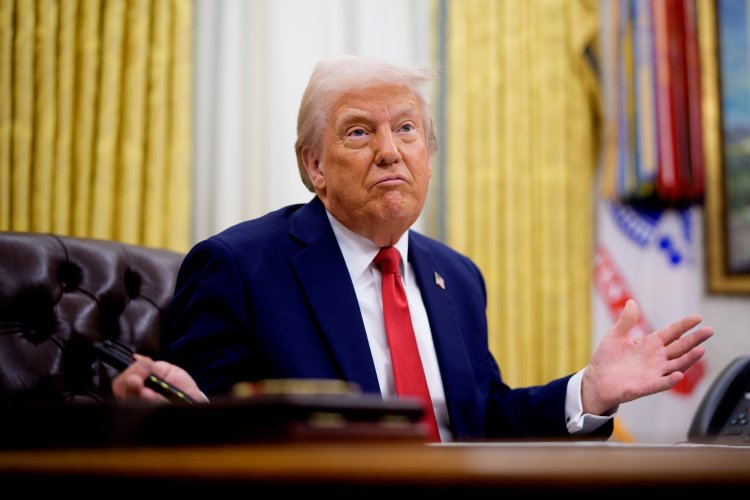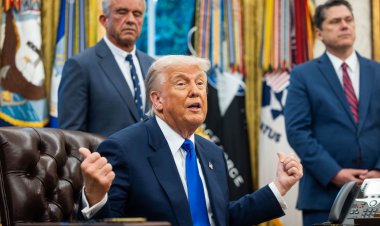Trump tells everyone to 'BE COOL' as the trade war impacts bond markets
The president's social media posts and statements from his aides have not succeeded in soothing market tensions.

In fact, he urged those increasingly concerned about rising recession fears, as his tariffs officially took effect, to remain calm.
“BE COOL,” he stated in a social media post. “Everything is going to work out well. The USA will be bigger and better than ever before!”
He followed this up with further financial advice, which he signed with his initials: “THIS IS A GREAT TIME TO BUY!!! DJT.”
Despite Trump’s apparent indifference, as well as the often contradictory reassurances from his aides, market reactions have not stabilized. Instead, the public comments from the White House defending the trade war during Sunday talk shows, along with Trump’s own defiance, have contributed to the uncertainty causing trading indexes to spiral and prompting retaliatory actions from other nations.
Following the White House's imposition of tariffs on all Chinese goods, now totaling a striking 104 percent, China announced its own additional tariffs on U.S. imports, bringing the total to 84 percent.
At the same time, EU member states voted to implement counter-tariffs against the U.S., set to take effect Tuesday. This marked the bloc's first official response to Trump’s tariffs on steel and aluminum from Europe, impacting nearly €21 billion of U.S. products—including soybeans, motorcycles, and orange juice—and set to be rolled out in three phases.
The EU has yet to respond to Trump’s 20 percent “reciprocal” tariffs on all EU exports, effective Wednesday, along with his latest 25 percent tariff on cars. A statement from Brussels indicated that European officials prefer to seek a diplomatic solution rather than further escalate the situation, noting that the new tariffs could be suspended at any time.
“The EU considers U.S. tariffs unjustified and damaging, causing economic harm to both sides, as well as the global economy,” the EU stated. “The EU has stated its clear preference to find negotiated outcomes with the U.S., which would be balanced and mutually beneficial.”
The widening trade conflict continued to impact financial markets, resulting in further losses on Wednesday. The S&P 500 experienced ongoing fluctuations while remaining near bear market territory, marking a 20 percent decline from a recent peak—an alarming signal for investors.
Perhaps more worrying was the ripple effect on government bond markets, typically viewed as safe havens during volatile times.
Yields on the 10-year Treasury note rose to 4.37 percent on Wednesday, reaching a peak of 4.5 percent earlier—the highest since February.
In recent days, industry CEOs and lobbyists have sought to reach Trump, attempting to present information about the economic consequences of a prolonged trade war. However, few within Trump's circle are certain about what might lead him to relent or what a resolution could entail.
One emerging speculation is that Trump may aim to declare victory by quickly securing trade agreements with allies such as Japan and South Korea, ultimately pressuring the European Union to negotiate as well. However, this remains speculative.
"I'm not entirely confident of anything right now," remarked a high-level executive, who spoke on the condition of anonymity due to the sensitive nature of the situation.
Ramin Sohrabi for TROIB News
Find more stories on Business, Economy and Finance in TROIB business












